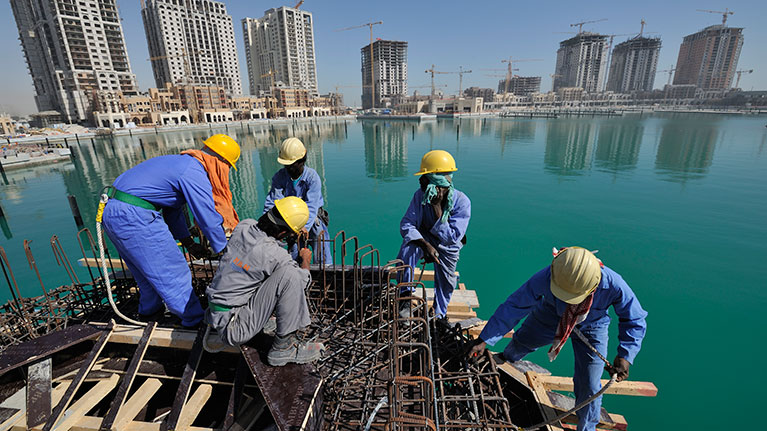Qatar’s major reforms in labour laws since 2010 has been carried out in over a span of just few years, FIFA President Gianni Infantino said, adding such moves took Europe hundreds of years.
Qatar has made more human rights reforms in recent years than any other mega-event host, said a professor during a debate at Play the Game 2022 event in Denmark last week.
“Our failure not to discuss that, is deeply damaging to mega-events and the human rights movement,” Professor Andy Spalding from the University of Richmond School of Law, said.
Spalding, an expert on international anti-bribery law as well as corruption and human rights in mega sports, was addressing the figure of 6,500 deaths in Qatar during the event in Denmark, clarifying the deaths were not all work or World Cup related.
A report published by The Guardian in February 2021 was criticised for its misleading headline that blamed deaths among Qatar’s South Asian community on the country’s preparations for the World Cup tournament this year.
The British publication’s article, headlined, “Revealed: 6,500 migrant workers have died in Qatar as it gears up for World Cup” purports to link the “shocking” death rate to the start of the 2022 FIFA World Cup journey more than a decade ago, failing to provide a clarification of the reasons behind the deaths.
Failing to cite official medical records to explain the circumstances of the deaths, The Guardian persisted to quote a labour rights expert in the Gulf who claimed it is “likely” that many workers who died were employed on these World Cup infrastructure projects.
However, Qatari authorities have slammed the figure as baseless.
Speaking to Doha News at the time, experts said the “deceptive” reporting is part of major Western media propaganda against Qatar.
Similar sentiments were shared by Spalding who said:”It’s egregiously inaccurate and we can do better than this”.
Challenging the panel, Minky Worden from Human Rights Watch said the death figures in Qatar were actually “likely to be an under-calculation” as only five embassies were approached for the date.
Last year’s Guardian article read that an average of 12 migrant workers from the South Asian countries reportedly died each week since December 2010. Statistics obtained from the embassies did not include migrant workers solely, but rather incorporated the total number of all deaths from nationals of India, Pakistan, Bangladesh, Nepal and Sri Lanka, across all occupations and sectors.
The figures comprise of those who passed away due to natural causes, such as chronic illnesses or traffic accidents.
Qatar’s labour reform efforts
Since winning the bid to host the FIFA World Cup 2022 in 2010, Qatar has found itself under the international spotlight, with waves of scrutiny from the west over the conditions of migrant workers and lack of adequate laws to protect them, prompting Doha to take lead in implementing changes.
Since, Qatar and its relevant governmental bodies have introduced historic reforms over in an effort to ensure the rights of workers are respected and upheld.
Among the most major steps was the dismantling of the controversial Kafala System which stopped workers from freely transfering jobs. Another major reform is the region’s first ever non-discriminatory minimum wage law, introduced last year.
In May last year, Qatar’s Ministry of Administrative Development, Labour and Social Affairs introduced a unified platform for complaints and disputes, which allows all members of society to submit reports against violations of the Labor Law and their employers.
In October 2021, Qatar held its first ever legislative elections for the two-thirds of the advisory Shura Council, where 30 out of the 45 members of the Council were elected in
public vote. In the elections, the Amir Sheikh Tamim bin Hamad Al Thani elected two women, neither ran in the elections, with one elected as vice-chairperson.
While at the World Economic Forum in Davos in late May, Qatar’s Amir Sheikh Tamim bin Hamad Al Thani shed light on the unfair criticism of the Gulf country over its hosting of the 2022 World Cup, describing it as anti-Arab.
“For decades now, the Middle East has suffered, from discrimination. And I have found that such discrimination is largely based on people not knowing us, and in some cases, refusing to get to know us,” said Sheikh Tamim.
Speaking at the Qatar Economic Forum in Doha last month, FIFA President Gianni Infantino made comparisons between changes in Qatar and elsewhere.
“It took us in Europe hundreds of years to arrive where we are now…in this part of the world, in Qatar, it has been done in a few years so it’s clear that at the beginning we need some time to assess it,” Infantino said.
The FIFA president noted the World Cup in Qatar served as an opportunity for change in the country, though he said he believes “progress would have been done anyway”.







